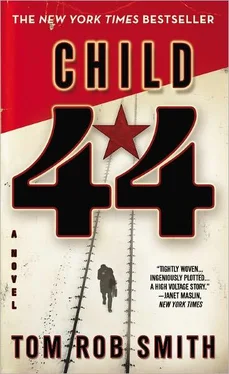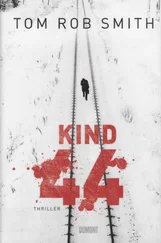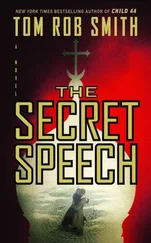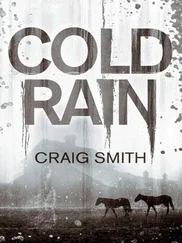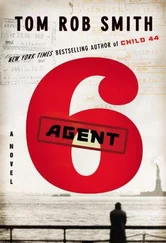— It’s over!
Anatoly considered this remark, turned back towards the forest and stepped out onto the ice. His footsteps were unsteady, sliding across the smooth surface. The ice sheet creaked under his weight, barely holding him. He didn’t slow down. Step after step after step, the ice was beginning to crack — black, crooked lines formed on the surface, criss-crossing and fanning out from underneath his feet. The faster he moved, the faster the lines appeared, multiplying in all directions. Icy water seeped up through the joints. He pressed forward: he was at the middle of the river, another ten metres to go to the other side. He looked down at dark, freezing water flowing beneath him.
Leo reached the edge of the riverbank, holstered his gun, stretched out his hand.
— The ice won’t hold. You won’t reach the woods.
Brodsky stopped and turned.
— I’m not trying to reach the woods.
He raised his right leg and with a sudden movement brought his boot crashing down, splintering the surface and puncturing through to the river underneath. Water rushed up, the ice broke apart and he fell through.
Completely numb, in shock, he allowed himself to sink: looking up at the sunlight. Then, feeling the pull upwards, he kicked himself downstream away from the break in the ice. He had no intention of surfacing. He’d disappear into this dark water. His lungs were beginning to sting and already he could feel his body fighting his decision to die. He kicked himself further downstream swimming as far away from the light as possible, away from any chance of survival. Finally his natural buoyancy lifted him to the surface; instead of air his face rose up against a solid sheet of ice. The slow-moving current dragged him further downstream.
The traitor wasn’t going to surface, no doubt he was swimming away from the air hole in an attempt to kill himself and protect his accomplices. Leo hurried down the riverbank, estimating where under the ice he might be. He unfastened his heavy leather belt and gun, dropped them on the ground and stepped out onto the frozen river, his boots slipping across the surface. Almost immediately the ice began to strain. He kept moving, trying to keep his footsteps light, but the ice was splintering and he could feel it sinking under his weight. Reaching the middle of the river, he crouched down, frantically brushing away the snow. But the suspect was nowhere to be seen — just dark water all around. Leo moved further downstream but fracture lines were chasing his every step, surrounding him from all sides. Water began to swell, the cracks came together. He looked up to the sky, filling his lungs, bracing himself as he heard a snap.
The ice collapsed.
Although he didn’t feel the full extent of the cold, doped up on amphetamines, he knew he had to move fast. At this temperature he had a matter of seconds. He spun around. There were shafts of light where the ice had broken in two places but beyond that the water was dark, shielded from the sun by a dense canopy of snow. He pushed away from the bottom, heading downstream. Unable to see anything he swam further and further, blindly groping right and left. His body was screaming for air. In response he increased his speed, kicking harder, pulling himself faster through the water. Soon he’d have no choice but to turn back or die. Realizing he wouldn’t get a second chance, that returning empty-handed might mean execution, he took another stroke downstream.
His hand brushed something: material, cloth, a trouser leg. It was Brodsky, lank against the ice. But as though his touch brought him back to life he started struggling. Leo swam underneath him, gripped him around the neck. The pain inside Leo’s chest was sharp. He had to get back to the surface. With one arm around the suspect’s neck he tried punching the ice above him but his blows glanced off the smooth hard surface.
Brodsky stopped moving. Concentrating, overriding every impulse in his body, he opened his mouth, filling his lungs with freezing water, welcoming death.
Leo focused on the shafts of sunlight upstream. He kicked hard, propelling them both towards the light. His prisoner was motionless, unconscious. Light-headed, Leo couldn’t hold his breath any longer. He took another kick — felt sunlight across his face — pushed upwards. The two men broke the water’s surface.
Leo gasped and gasped again. But Brodsky wasn’t breathing. Leo pulled him towards the riverbank, smashing his way through the fractured chunks of ice. His feet touched the riverbed. He pulled himself up onto the bank, dragging his prisoner with him. Their skin was pale blue. Leo couldn’t stop shaking. In contrast the suspect remained perfectly still. Leo opened the man’s mouth, tipping the water out, blowing air into his lungs. He pushed down on his chest, blew air into his lungs, he pushed down on his chest, blew air into his lungs.
— Come on!
Brodsky spluttered back into consciousness, doubling over and vomiting up the icy water that filled his stomach. Leo didn’t have time to feel relief. They had minutes before they’d die from hypothermia. He stood up. He could see his three officers in the near distance.
The men had spotted Leo disappearing into the river and realized that their superior officer had been right all along. In a split second the balance of power shifted away from Vasili and back to Leo. Their disgruntled feelings towards his handling of Fyodor now meant nothing. The only reason they’d felt safe enough to let their emotions poke through had been their expectation that this operation would fail and Leo would be relieved of his power. That was not the case: his position would be stronger than ever. They were running as fast as they could; their lives depended on it.
Leo dropped down to the prisoner’s side. Brodsky’s eyes were closing — he was drifting back into unconsciousness. Leo hit him across the face. It was essential he remain awake. He hit him again. The suspect opened his eyes but almost immediately began to close them again. Leo hit him again and again and again. They were running out of time. He stood up, calling to his men.
— Hurry!
His voice was becoming softer, his energy sapping as finally the cold caught up with him and his chemical invincibility began to melt away. The drugs had passed their peak. An extraordinary fatigue was repossessing his body. His officers arrived.
— Take off your jackets. Get a fire started.
All three took their jackets off, wrapping one around Leo and the other two around Brodsky. That wasn’t going to be enough. They needed a fire. The three officers looked for wood. There was a picket fence some distance away and two of the agents ran towards it while the third agent began ripping the sleeve of his coarse cotton shirt into strips. Leo remained focused on his prisoner, hitting him to keep him awake. But Leo was also feeling sleepy. He wanted to rest. He wanted to close his eyes.
— Hurry!
Though he’d meant to shout, his voice was barely audible.
The two officers returned with planks ripped from the fence. They cleared an area of ground, kicking aside the snow and laying timbers across the frozen soil. Upon these timbers they positioned the strips of cotton. Building around these strips they balanced thin wooden shards, creating a pyramid formation. One of the officers took out his lighter, tipping the fluid over the cotton. The flint sparked, the cotton caught light, began to burn. The wood smouldered. But it was damp and refused to catch. Smoke spiralled upwards. Leo couldn’t feel any heat. The wood was taking too long to dry out. He ripped the lining from the inside of the jacket, adding this to the fire. If it went out they’d both die.
Between them they only had one lighter remaining. The officer carefully pulled the components apart and tipped the last of the lighter fuel over the struggling fire. The flames grew, aided by a crumpled cigarette carton and shredded cigarette papers. All the officers were on their knees, stoking the fire. The timbers began to burn.
Читать дальше
